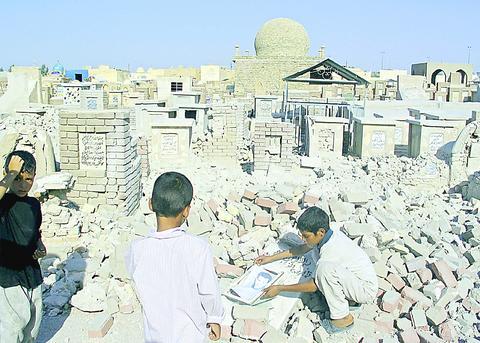Insurgents fired rocket-propelled grenades from a mosque at US troops in northern Iraq yesterday, sparking clashes that left two dead and 34 wounded, the military said.
Army Captain Angela Bowman said patrolling US forces were attacked twice before dawn near Tal Afar, about 50km west of Mosul. Soldiers returned fire during both assaults, killing two of the attackers, she said. No US casualties were reported.

PHOTO: AFP
Provincial health chief Rabie Yasin al-Khalil said 32 people were injured in the clashes.
Citing a doctor at a hospital in Tal Afar, the US military said 34 civilians were wounded, 26 of them women and children, "by flying debris and broken glass during the attacks on multinational forces.
Many civilians were sleeping on their rooftops to escape the summer heat."
The military said troubles began at 3am when insurgents fired eight rocket-propelled grenades at a passing US patrol. Seven of the RPG rounds were fired from a nearby mosque, the statement said.
Guerrillas attacked again three hours later, also from the mosque, and US troops fired back, killing two assailants, the statement said.
Meanwhile, saboteurs blew up an export pipeline in southern Iraq on Sunday in the latest in a series of attacks targeting the volatile country's crucial oil industry, a senior oil official said.
The explosion occurred in al-Radgha, about 50km southwest of Basra, an official at the state-run South Oil Co said on condition of anonymity.
The pipeline, which connects the Rumeila oilfields with export storage tanks in the Faw peninsula, was ablaze after the attack and emergency workers were struggling to put the fire out, the official said.
Insurgents have launched repeated attacks on Iraq's vital oil industry in a bid to undermine the interim government and reconstruction efforts.
On Saturday, insurgents blew up another pipeline in the West Qurna oilfields, about 150km north of Basra.
Also Saturday, a domestic oil pipeline in Nahrawan, a desert region 20 miles east of Baghdad, was ablaze, though oil officials could not confirm if the fire was the result of sabotage. The pipeline transports oil to the Dora refinery near the capital.
It was unclear how the latest attack would effect exports out of the south, which have already fallen to about 900,000 barrels a day -- about half the normal average of 1.8 million barrels a day -- after an attack Wednesday on a cluster of pipelines linked to the Rumeila oilfields.

MAKING WAVES: China’s maritime militia could become a nontraditional threat in war, clogging up shipping lanes to prevent US or Japanese intervention, a report said About 1,900 Chinese ships flying flags of convenience and fishing vessels that participated in China’s military exercises around Taiwan last month and in January last year have been listed for monitoring, Coast Guard Administration (CGA) Deputy Director-General Hsieh Ching-chin (謝慶欽) said yesterday. Following amendments to the Commercial Port Act (商港法) and the Law of Ships (船舶法) last month, the CGA can designate possible berthing areas or deny ports of call for vessels suspected of loitering around areas where undersea cables can be accessed, Oceans Affairs Council Minister Kuan Bi-ling (管碧玲) said. The list of suspected ships, originally 300, had risen to about

DAREDEVIL: Honnold said it had always been a dream of his to climb Taipei 101, while a Netflix producer said the skyscraper was ‘a real icon of this country’ US climber Alex Honnold yesterday took on Taiwan’s tallest building, becoming the first person to scale Taipei 101 without a rope, harness or safety net. Hundreds of spectators gathered at the base of the 101-story skyscraper to watch Honnold, 40, embark on his daredevil feat, which was also broadcast live on Netflix. Dressed in a red T-shirt and yellow custom-made climbing shoes, Honnold swiftly moved up the southeast face of the glass and steel building. At one point, he stepped onto a platform midway up to wave down at fans and onlookers who were taking photos. People watching from inside

Japan’s strategic alliance with the US would collapse if Tokyo were to turn away from a conflict in Taiwan, Japanese Prime Minister Sanae Takaichi said yesterday, but distanced herself from previous comments that suggested a possible military response in such an event. Takaichi expressed her latest views on a nationally broadcast TV program late on Monday, where an opposition party leader criticized her for igniting tensions with China with the earlier remarks. Ties between Japan and China have sunk to the worst level in years after Takaichi said in November that a hypothetical Chinese attack on Taiwan could bring about a Japanese

The WHO ignored early COVID-19 warnings from Taiwan, US Deputy Secretary of Health and Human Services Jim O’Neill said on Friday, as part of justification for Washington withdrawing from the global health body. US Secretary of State Marco Rubio on Thursday said that the US was pulling out of the UN agency, as it failed to fulfill its responsibilities during the COVID-19 pandemic. The WHO “ignored early COVID warnings from Taiwan in 2019 by pretending Taiwan did not exist, O’Neill wrote on X on Friday, Taiwan time. “It ignored rigorous science and promoted lockdowns.” The US will “continue international coordination on infectious